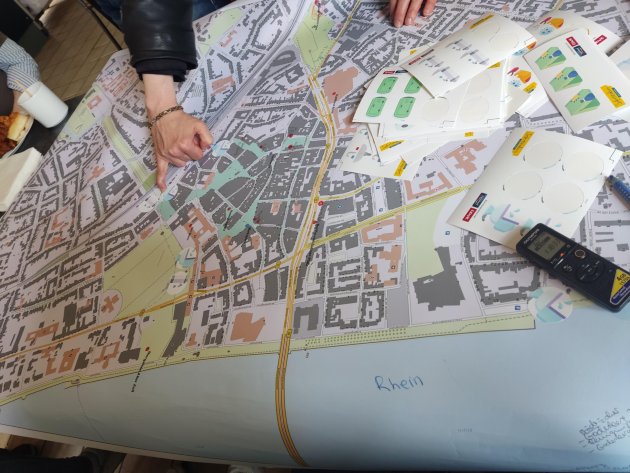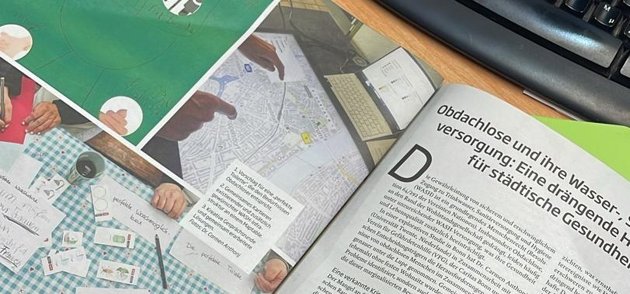Geohealth
The role of water- and health-related local community knowledge and perceptions in decision-making
7 min
We often associate unsafe access to water, sanitation and hygiene (WASH) with the Global South. However, in the Global North there are large pockets of disadvantaged population groups and people who are suffering from the adverse health effects of a lack of access to drinking water and toilets. This includes people experiencing homelessness in urban areas. Working with them, researchers conducted a dedicated study on the subject to identify the related problems and potential solutions.
People experiencing homelessness in urban areas of high-income countries (HICs) are generally facing more WASH-related insecurities than their fellow citizens. During extreme weather events, these insecurities are further complicated.
The research team behind this study, led by ITC Assistant Professor Carmen Anthonj under the ITC Blue Skies Fund, was the first to conduct a systematic scoping review of peer-reviewed literature on this topic. They reviewed 50 publications on the nexus of WASH, extreme weather events and homelessness.
This empirical part of this study for the first time also involved homeless community members as co-researchers. 45 individuals were involved as key stakeholders in co-defining challenges they are facing, while also conducting inspections of the WASH infrastructure they are using, co-designing the most suitable data collection methods, and jointly identifying suitable interventions which were then discussed with decision-makers.
Click here to read UT scientist works with homeless people as ‘co-researchers’ - U-Today (utoday.nl)
Data were collected from March to November 2023 in Bonn, Germany, from and with people experiencing homelessness. Researchers used different methods, including in-depth interviews, participatory mapping, combined arts-based research workshops and group discussions. Data were collected from their service providers (social workers), and spot checks were done on public urban drinking water, sanitation and hygiene infrastructure.
The researchers:

Participatory mapping of WASH infrastructure challenges and solutions in Bonn with individuals experiencing homelessness. Picture by C. Anthonj 2023
The Human Right to Water and Sanitation is often not met for people experiencing homelessness in HIC urban areas, with women as the most vulnerable subgroup.
Public drinking water fountains, toilets, handwashing facilities, and showers are scarce, frequently unavailable and often pose safety and cleanliness issues. Access to non-public facilities may be cost-prohibitive for homeless populations.
Those sleeping rough in encampments or shelters are often forced to limit water consumption, forego healthy hygiene behaviours, and resort to open urination and defecation, all of which carry health risks.
Click here to read the study "Co-defining WASH (In)Security challenges among people experiencing homelessness. A qualitative study on the Human Right to Water and Sanitation from Bonn, Germany".
These challenges are made worse by extreme weather events, such as heatwaves, extreme cold, heavy rain and flooding. During such events, access to WASH becomes even trickier and service providers have more trouble delivering extra relief.
The effects of certain extreme weather events like heatwaves on the health and WASH conditions of people experiencing homelessness are better understood than other events, such as flooding.
Click here to read the study "Invisible struggles: WASH insecurity and implications of extreme weather among urban homeless in high-income countries - A systematic scoping review ".
As information on limited WASH access and health circumstances of people experiencing homelessness is scarce, the problems of these populations are at risk of being overlooked. This could make it even harder for effective solutions to be found and implemented.
To improve WASH for people experiencing homelessness, involving them is key. Their knowledge is vital for informing targeted health messaging and health-related interventions to improve WASH.
Their suggestions included adapting existing infrastructure, opening up existing but inaccessible infrastructure, and constructing multifunctional WASH kiosks with integrated showers, toilets, sinks and vending machines for hygiene materials.
An idea that was very easy to implement was the development and use of an artificial coin, similar to the ones used for shopping carts in supermarkets, to use public-for-pay toilets free of charge. Overall, proactive, long-term sustainable solutions were preferred over reactive, short-term options.
Click here to ready the study "A question of human dignity”. Identifying solutions to improve WASH for people experiencing homelessness. A case study from Germany.
Results of this project were disseminated to people experiencing homelessness directly through posters placed in shelters and meeting points.
It was shared with the broad public through a street newspaper prepared and sold by people experiencing homelessness.
Website blogs, newsletter contributions and journal articles were written not only for the scientific community but also for practitioners in a journal for social workers.

Results of this study communicated in German through a street newspaper prepared and sold by people experiencing homelessness.
Finally, an invited speech was held at the Committee on Social Affairs, Migration and Health of the City of Bonn to health-related policy-makers, and the list of recommendations resulting from this research was shared with the Mayor Already, the City committed to building additional wells in the city centre, and additional sanitation facilities.
Much remains to be done to serve people experiencing homelessness in HICs better with WASH. Different insecurities exist among different sub-groups e.g. women, people with limited mobility, and are aggravated during heatwaves and other extreme weather events.
The literature, as well as their experiences, shed light on the underlying complexities and the implications of different, often interconnected challenges, including instability, mobility, preexisting diseases, mental health conditions and substance use disorder.
Realizing safe WASH for all requires collaboration between homeless communities, governmental bodies, NGOs, businesses, and sanitation experts.